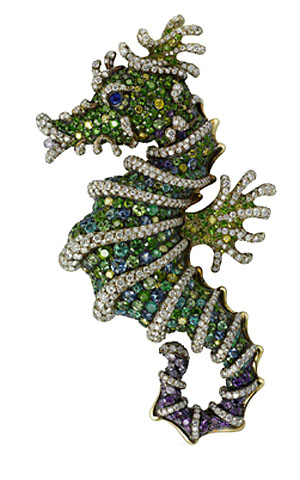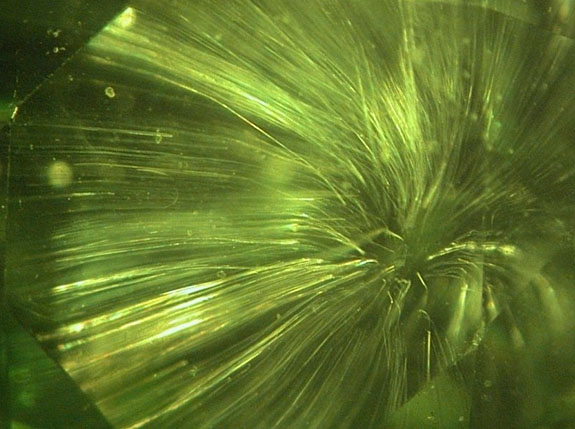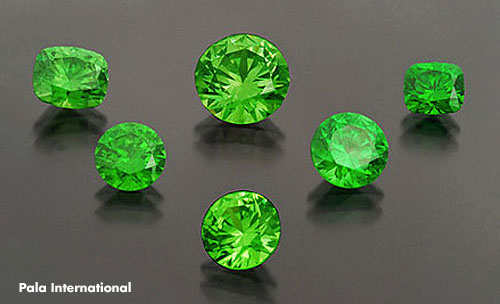January 2nd, 2014
Known for their brilliant green color and fiery dispersion, demantoid garnets are unique because their inclusions — usually seen as flaws in other gems — are considered highly coveted aesthetic attributes. Garnet is the official January birthstone.

Distinctive horsetail inclusions that seem to spray out from the center of the stone are markers for the world’s most valuable demantoid garnets, a variety mined in the Ural Mountains of Russia. A beautiful, well-formed inclusion can increase the value of the gemstone considerably, according to the International Color Stone Association.

Demantoid garnet was first discovered in 1886 and became a favorite of Russian royalty and designer Carl Fabergé, who incorporated them into his famous jeweled eggs and other jewelry, such as the pin seen above. Russian mining of demantoid garnet was suspended after the Bolshevik Revolution in 1917, but finally resumed in the 1970s.
Demantoid gets its name from the Dutch words for “diamond-like.” The stone owes its impressive brilliance to two main factors: A high refractive index and a high dispersion (its ability to separate light into the spectrum of colors). Demantoid's dispersion rating is the highest of all gemstones, including diamond.

The horsetail inclusions are actually golden brown bundles of the mineral chrysotile. They seem to gather in the center of the stone and bend outward like a fireworks display.
Although demantoid garnet is now mined in other parts of the world, including Iran, Namibia, Pakistan, Italy, Madagascar and Canada, the Russian demantoid sets the mark by which all the others are compared.

Demantoid by definition will always be green, but the color range varies from yellowish-green to blue-green. The lighter colors tend to have the most fire and brilliance, while the deeper green colorations tend to fetch the highest prices.

African-origin demantoid tends to be yellowish-green, olive green or brownish, due to higher concentrations of iron. Russian material, on the other hand, is colored by chromium and tends to be vivid green. Demantoid garnets are rarely found in sizes larger than 2 carats.

Distinctive horsetail inclusions that seem to spray out from the center of the stone are markers for the world’s most valuable demantoid garnets, a variety mined in the Ural Mountains of Russia. A beautiful, well-formed inclusion can increase the value of the gemstone considerably, according to the International Color Stone Association.

Demantoid garnet was first discovered in 1886 and became a favorite of Russian royalty and designer Carl Fabergé, who incorporated them into his famous jeweled eggs and other jewelry, such as the pin seen above. Russian mining of demantoid garnet was suspended after the Bolshevik Revolution in 1917, but finally resumed in the 1970s.
Demantoid gets its name from the Dutch words for “diamond-like.” The stone owes its impressive brilliance to two main factors: A high refractive index and a high dispersion (its ability to separate light into the spectrum of colors). Demantoid's dispersion rating is the highest of all gemstones, including diamond.

The horsetail inclusions are actually golden brown bundles of the mineral chrysotile. They seem to gather in the center of the stone and bend outward like a fireworks display.
Although demantoid garnet is now mined in other parts of the world, including Iran, Namibia, Pakistan, Italy, Madagascar and Canada, the Russian demantoid sets the mark by which all the others are compared.

Demantoid by definition will always be green, but the color range varies from yellowish-green to blue-green. The lighter colors tend to have the most fire and brilliance, while the deeper green colorations tend to fetch the highest prices.

African-origin demantoid tends to be yellowish-green, olive green or brownish, due to higher concentrations of iron. Russian material, on the other hand, is colored by chromium and tends to be vivid green. Demantoid garnets are rarely found in sizes larger than 2 carats.

